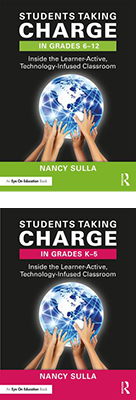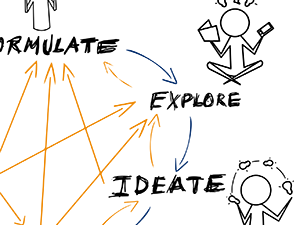
Explore the power of problem-based learning in the classroom. Design a problem-based task, a rubric to drive instruction, and a scaffold of rich and diverse learning activities to implement with your students
Syllabus
- Understanding how “Raising Academic Rigor,” “Engaging Students in Learning,” and “Building Student Responsibility for Learning” go hand-in-hand
- Developing authentic, open-ended, problem-based tasks that create a felt-need to learn (expectations adjusted if the participant has taken the introductory course)
- Designing analytic rubrics to offer clearly articulated expectations, a roadmap for all learners, and challenges for gifted learners
- Designing a scaffold for learning to develop differentiated learning and practice activities
- Developing one or more other structures to support the unit, e.g.:
- Formative Assessments to drive instructional planning
- Facilitation Questions to probe students’ thinking at higher cognitive levels
- Facilitation Grid to manage your ongoing student facilitation
Watch IDE Corp.’s YouTube video “What’s the difference between project-based learning and problem-based learning?“.
 This course will use your choice of Dr. Nancy Sulla’s books, Students Taking Charge In Grades K-5 or Students Taking Charge In Grades 6-12 as a resource. Only one is required. The assigned book must be purchased in advance. Access to MyQPortal is included for all participants while enrolled in the VLC. 25 contact hours.
This course will use your choice of Dr. Nancy Sulla’s books, Students Taking Charge In Grades K-5 or Students Taking Charge In Grades 6-12 as a resource. Only one is required. The assigned book must be purchased in advance. Access to MyQPortal is included for all participants while enrolled in the VLC. 25 contact hours.





 In this course, participants will leverage choice and technology to provide students with the ultimate differentiated learning environment. They will develop differentiated digital activity lists rooted in rigorous instruction that offer multiple ways to learn and apply content. Participants will explore autonomy, purpose, and mastery as motivators in all learning environments. They will design differentiated activity lists to put students in charge of their own learning, creating a structure that allows students to make decisions within a structured framework. Making informed decisions is an essential life skill that teachers can support with intentional classroom practices.
In this course, participants will leverage choice and technology to provide students with the ultimate differentiated learning environment. They will develop differentiated digital activity lists rooted in rigorous instruction that offer multiple ways to learn and apply content. Participants will explore autonomy, purpose, and mastery as motivators in all learning environments. They will design differentiated activity lists to put students in charge of their own learning, creating a structure that allows students to make decisions within a structured framework. Making informed decisions is an essential life skill that teachers can support with intentional classroom practices. Participants in this course will use Reinventing the Classroom Experience by Dr. Nancy Sulla as a resource. The assigned book must be
Participants in this course will use Reinventing the Classroom Experience by Dr. Nancy Sulla as a resource. The assigned book must be